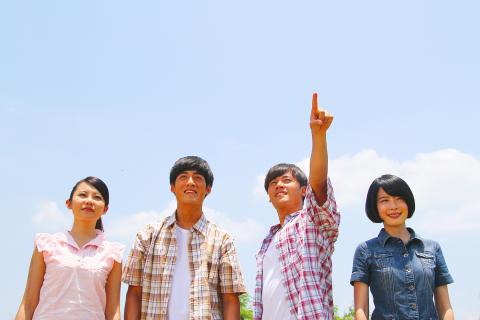Inspired by the history of Greater Kaohsiung’s Chishan District (旗山), which was once the country’s largest producer and exporter of bananas, A Story about Banana tells the story of a poor farmer’s triumph over a greedy plutocrat. Though billed as an uplifting tale for the working masses during these tough economic times, the film never achieves any kind of social message due to its creators’ inability to tell a decent story.
Set in the 1960s, the film begins with A-tien (Huang Wen-hsing, 黃文星) and his friend A-da (Wang Hung-wen, 王泓文) returning to Chishan District after a failed attempt to make it in the big city. Like many of their fellow villagers, the pair find employment at a banana plantation owned by Uncle Wang (Chang Chia-nien, 張嘉年), who works with local big shot and banana dealer Chairman Chen (Wu Chung-chiang, 吳仲強).
Young, good-looking but callous, Chairman Chen soon hatches an evil plan to monopolize the lucrative banana business, trick local growers into signing unfair contracts and plot a political marriage with Uncle Wang’s daughter A-mei (Lee Kang-yi, 李康宜), who has no interest in diamonds and fancy clothes and is attracted to the kind-hearted, hard-working A-tien.

Photo courtesy of Ho Bo Films
Determined to improve the life of his impoverished family and marry A-mei, A-tien starts his own banana business together with A-da. Their venture, however, draws opposition from Chairman Chen, but A-tien’s persistence eventually wins the villagers’ support, and good triumphs over evil.
Despite the film’s inspiring tag line, Nie Hua-hsun’s (聶華勳) debut is plagued with a litany of problems. The cinematography is dull and the art direction seems virtually non-existent. And audiences can be excused for mistaking the movie for a poorly produced television drama, where actors read out lines in a stiff manner.
Not only does the film flop in the technical department, it has done no better in its handling of the uneven cast of actors. An alumnus of the television talent show Super Idol (超級偶像), up-and-coming Hoklo-language (commonly known as Taiwanese) singer Huang does almost nothing as the leading man in the movie except for constantly flashing his toothsome smile. The same can be said for seasoned actress Lee, who is best known for her acclaimed work with director Chang Tso-chi (張作驥).

Photo courtesy of Ho Bo Films
As the film’s villain, model and television actor Wu delivers a performance so over-the-top and cliched that it can only be described as kitsch, while veteran actors Mei Fang (梅芳) and Chang Chia-nien are seen struggling with their carelessly written roles.
All in all, director Nie forges an inane movie complete with an embarrassingly outdated plot. One reason to sit through A Story about Banana is to see how your hard earned tax dollars are being spent, as the film received NT$6 million from the government’s Subsidy For Film Production (電影輔導金).

June 2 to June 8 Taiwan’s woodcutters believe that if they see even one speck of red in their cooked rice, no matter how small, an accident is going to happen. Peng Chin-tian (彭錦田) swears that this has proven to be true at every stop during his decades-long career in the logging industry. Along with mining, timber harvesting was once considered the most dangerous profession in Taiwan. Not only were mishaps common during all stages of processing, it was difficult to transport the injured to get medical treatment. Many died during the arduous journey. Peng recounts some of his accidents in

“Why does Taiwan identity decline?”a group of researchers lead by University of Nevada political scientist Austin Wang (王宏恩) asked in a recent paper. After all, it is not difficult to explain the rise in Taiwanese identity after the early 1990s. But no model predicted its decline during the 2016-2018 period, they say. After testing various alternative explanations, Wang et al argue that the fall-off in Taiwanese identity during that period is related to voter hedging based on the performance of the Democratic Progressive Party (DPP). Since the DPP is perceived as the guardian of Taiwan identity, when it performs well,

A short walk beneath the dense Amazon canopy, the forest abruptly opens up. Fallen logs are rotting, the trees grow sparser and the temperature rises in places sunlight hits the ground. This is what 24 years of severe drought looks like in the world’s largest rainforest. But this patch of degraded forest, about the size of a soccer field, is a scientific experiment. Launched in 2000 by Brazilian and British scientists, Esecaflor — short for “Forest Drought Study Project” in Portuguese — set out to simulate a future in which the changing climate could deplete the Amazon of rainfall. It is

The Taiwan People’s Party (TPP) on May 18 held a rally in Taichung to mark the anniversary of President William Lai’s (賴清德) inauguration on May 20. The title of the rally could be loosely translated to “May 18 recall fraudulent goods” (518退貨ㄌㄨㄚˋ!). Unlike in English, where the terms are the same, “recall” (退貨) in this context refers to product recalls due to damaged, defective or fraudulent merchandise, not the political recalls (罷免) currently dominating the headlines. I attended the rally to determine if the impression was correct that the TPP under party Chairman Huang Kuo-Chang (黃國昌) had little of a